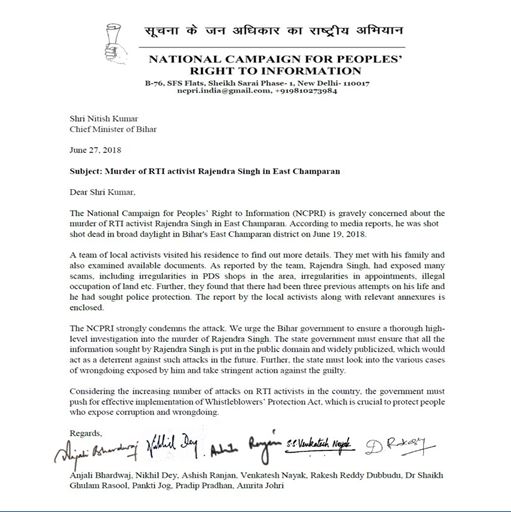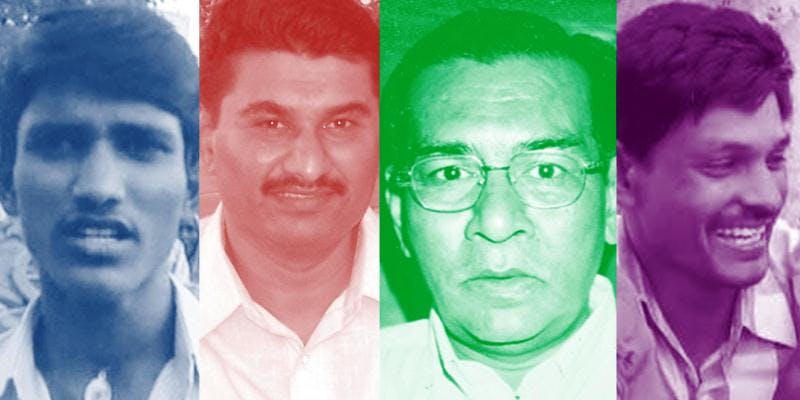On 19th June 2018 RTI activist Rajendra Singh was shot dead in Motihari town, Bihar. He had exposed discrepancies in the functioning of an LIC office, irregularities in the recruitment of teachers and police personnel, and misuse of funds under the Indira Awas Yojana housing project. After all these fights for transparency, he had to pay back for his honesty. Government authorities ignored his request of providing security as he survived three murder attempts in the past. This yet again raises the question on intentions of Government both at the centre and state to safeguard the watchdog of Indian democracy.

The Nation Campaign for People’s Right to Information (NCPRI) had urged Bihar’s Chief Minister Nitish Kumar to effectively implement Whistleblower’s Protection Act to protect lives of RTI activists. In last three months, Bihar alone has witnessed three murders of RTI activists in districts of Vaishali, Jamui and Motihari.
No centralisied data on pending RTI application, says MoS Jitendra Singh
WHISTLEBLOWERS (AMENDMENTS) BILL: Corruption has been an issue of all seasons for our country. The Right to Information (RTI) activists have been playing a vital role as a spine in world’s largest democracy increasing the accountability of an elected government. In 2015, the Whistle Blower’s Protection Act (WBP Act) made rounds of the parliament but just as an amendment bill and not as an operational act/law that too with severe dilutions. The government added 10 exemptions to the bill.
This bill was framed without any public consultation with the civil society or RTI activists. Anjali Bharadwaj and Amrita Johri in an article via The Hindu wrote, “The amendment Bill seeks to remove immunity provided to whistle-blowers from prosecution under the draconian Official Secrets Act (OSA) for disclosures made under the WBP law. Offences under the OSA are punishable by imprisonment of up to 14 years. The threat of such stringent penalties would deter even genuine whistle-blowers. The basic purpose of the WBP Act is to encourage people to report wrongdoing. If whistle-blowers are prosecuted for disclosing information as part of their complaints and not granted immunity from the OSA, the very purpose of the law would be defeated.”
In 2016, a Supreme Court bench of Justice T.S.Thakur and Justice A.K.Sikri said there was “absolute ‘vacuum’ which could not be allowed to go on.” “Take a firm stand on the time frame within which you will bring administrative set-up to protect whistleblowers. This is part of the evolution of the system to meet the need of people. The concept of a whistleblower is a global phenomenon and has become a reality. They will be there and the government cannot wish it away”. This was a diktat to Modi government’s reluctance towards WBP bill.
Many countries of the world have kept no exemptions when it comes to whistleblowing but Modi government made restrictions by adding exemptions making the bill a toothless tiger. A report released by an Australian non-government organization ‘Blueprint’ for Free Speech, Transparency International Australia, Griffith University and Melbourne University rates India as one of the countries that do “the least to ensure that whistleblowers can speak out without fear of retribution.
Bihar, Maharashtra among top five states to receive most complaints under RTI
THE UNPROTECTED CRUSADERS OF CORRUPTION- The RTI activists fight for their rights and/or those of others, but they are hardly protected by the police and judiciary. According to a report of Commonwealth Human Rights Initiative (CHRI) since 2006, 422 RTI activists have undergone attacks which includes-
- Murder- 73
- Physical assault- 166
- Threatening- 183
In 2018 alone, nationwide 7 RTI activists lost their lives. Cases have been filed for only 137 murders, assaults and harassment (out of 369). No action was taken in 141 cases. (No information is available on the status of 91 cases). Despite the action, the conviction rate remains very low. The state remains in fear to get exposed to corrupt deeds where its leaders and ministers are involved. The number of RTI applications continues to grow. The RTI activists not only expose corrupt practices and crimes, besides provide an alternative leadership at the local level just like Rajendra Singh of Motihari. In fact, some of the most dedicated RTI activists are journalists and the reason why small-town journalists are harassed, assaulted and murdered are similar to those affecting the RTI activists. According to the Committee to Protect Journalists and the Indian branch of the International Federation of Journalists, the number of journalists who have been assassinated has risen from 2 in 2014 to 6 in 2016 and, according to the CPJ website “In the 27 cases of journalists murdered for their work in India since CPJ began keeping records in 1992, there have been no convictions”.
Biased, frivolous, and spineless: the state of Indian media
A total of 1.275 crores RTI applications have been made to state and central governments between 2005-2015. With such a giant figure of increasing queries against corruption and bad governance of elected government, the question we should ask-
Is our democracy not responsible to save these crusaders of corruption?
RTI activist’s work is revealing the character of corruption in India today and impunity to miscreants, corrupt elements through a weak law has created the conditions of more violence against the RTI activists. The so-called slogan of ‘Naa Khaaunga-Naa Khaane Doonga’ by Prime Minister Modi is meaningless until and unless the Whistleblowers Protection Act becomes a genuine shield for all those whose are determined to expose and fight corruption. Hope this monsoon session the WBP act strengthened by eliminating amendments which are a threat to whistleblowers and is taken with utmost seriousness. Words of Nobel laureate Czestaw Mitosz fit best to this fight against corruption- “In a room where people unanimously maintain a conspiracy of silence, one word of truth sounds like a pistol shot.”
Disclaimer: The opinions expressed in this article are the personal opinions of the author. The facts and opinions appearing in the article do not reflect the views of NEWSD and NEWSD does not assume any responsibility or liability for the same.


















